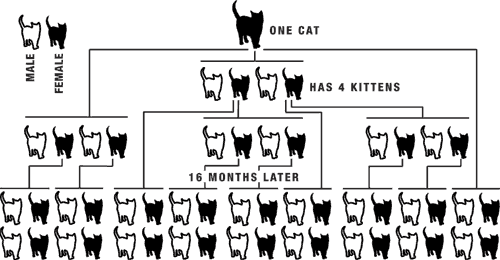
Why Early Spaying and Neutering (ESN) is Essential for Breeders, Pet Families, and Kittens
As breeders, it's essential to fulfill our responsibilities with care. Ethical breeding means making choices that prioritize the well-being of our cats, their future families, and the overall health of the breed. One important aspect of this is early spaying and neutering (ESN).
The Importance of Early Spay/Neuter (ESN) for Kittens
Early Spay/Neuter (ESN) is a vital practice for the health and welfare of kittens. One of the key benefits of ESN is that it guarantees your kitten has undergone a veterinary examination at least once. This initial vet visit is essential as it provides a professional health check-up, confirming that the kitten is in good condition and free from any serious health issues before the procedure.
Healthy Ragdoll kittens weighing at least 2 to 2.5 pounds can be safely spayed or neutered as early as 8 weeks old. However, our Ragdoll kittens are typically spayed or neutered at around 11 or 12 weeks old.
Veterinarians are diligent about not spaying or neutering any kitten with serious health concerns. This practice acts as a safeguard, ensuring that only healthy kittens undergo the procedure, which minimizes the risk of complications. Additionally, early intervention helps control the pet population and prevents behavioral issues related to sexual maturity.
Benefits of early spaying and neutering include:
- Faster Surgery and Recovery: Young kittens have less fat, making it easier to find and remove reproductive organs with minimal bleeding. They need less anesthesia, leading to quicker recovery times.
- Reduced Cancer Risk: ESN almost completely eliminates the risk of reproductive cancers, like mammary and testicular tumors, and uterine infections (pyometra).
- Decreased Disease Incidence: It lowers the chances of Feline Leukemia Virus (FeLV) and Feline Immunodeficiency Virus (FIV), which are often spread through mother cats or fighting.
- Behavioral Improvements: ESN can reduce nuisance behaviors like urine spraying, yowling, and fighting over mates.
Health Advantages for Females:
- Reduced Risk of Mammary Cancer: Early spaying significantly lowers the risk of mammary cancer, which is often malignant in cats.
- Prevention of Uterine Infections: Spaying eliminates the risk of uterine infections, like pyometra, which can be life-threatening.
Health Advantages for Males:
- Prevention of Testicular Cancer: Neutering eliminates the risk of testicular cancer.
- Reduced Prostate Issues: Neutering reduces the risk of prostate enlargement and related infections.
- Behavioral Benefits: Early neutering prevents the development of undesirable behaviors like spraying.
Enhancing Pet Health and Longevity
Studies show that spayed and neutered pets live longer. For example, a University of Georgia study found that neutered male dogs live 13.8% longer, and spayed female dogs live 26.3% longer. Similar results were seen in cats, with spayed females living 39% longer and neutered males 62% longer. The reduced urge to roam and the decreased risk of certain cancers contribute to this increased lifespan.
Intact female pets have a higher chance of developing potentially fatal conditions like pyometra and reproductive system cancers. Neutering male pets eliminates the risk of testicular cancer and benign prostatic hyperplasia, which can affect their ability to defecate.
The Role of Pet Families in Ethical Breeding
Pet families are vital in promoting ethical breeding practices. By adopting from breeders who prioritize early spay/neuter (ESN) and adhere to responsible breeding standards, families can significantly enhance the breed's overall health and longevity. Ethical breeders ensure their kittens are well-socialized, healthy, and free from genetic disorders. They also provide thorough health checks and vaccinations, giving the kittens a strong start in life.
Supporting ethical breeders helps maintain the breed's integrity and reduces the number of unwanted litters and the burden on animal shelters. Additionally, pet families who invest in ethically bred kittens are more likely to receive ongoing support and guidance from the breeder, ensuring a smooth transition and a lifetime of companionship.
Our Practice
At our cattery, we spay or neuter all pet and show/alter kittens, typically at 11 or 12 weeks old, before they leave for their new homes. This policy ensures every kitten benefits from the health and behavioral advantages of early spaying and neutering, in line with best practices.
Conclusion
Responsible breeders should spay or neuter their kittens between 8-16 weeks old, making sure they do not go to new homes before 12 weeks and are already fixed. Supporting reputable breeders who prioritize early spay/neuter (ESN) and health testing is crucial. Purchasing from responsible breeders that practice ESN saves you both time and money. This is because the financial burden of the surgery and any potential complications falls on the breeder, not on you. The breeder can also monitor the kittens during their recovery, sparing you the stress and responsibility. Moreover, young kittens recover more easily than older ones. Therefore, please choose a responsible breeder that practices ESN.
